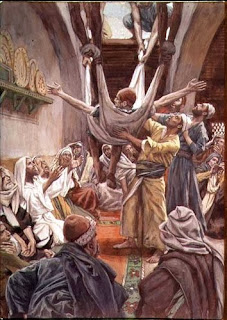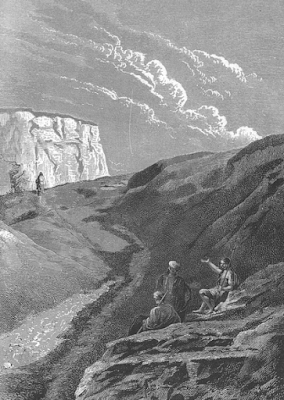"How deserted lies the city"
by Julius Schnorr von Carolsfeld
from "Bibel in Bildern"1851-1860
TODAY'S SPECIAL: Lamentations1:1-22
TO CHEW ON: "Her adversaries have become the master, Her enemies prosper; For the Lord has afflicted her Because of the multitude of her transgressions. Her children have gone into captivity before the enemy." Lamentations 1:5
In the next several weeks we'll be reading through all of Lamentations. It is a sad book originally titled "Ekah," the first word of the book. Ekah means how or alas. Some also called it Qinot or "Lamentations" and that name has stayed with the book.
Many scholars attribute its authorship to Jeremiah. He wrote it against the backdrop of tragic events in Judah.
The kingdom was in moral decline. At a time when they were subjects to the Babylonian King Nebuchadnezzar, King Zedekiah rebelled and Nebuchadnezzar came against Jerusalem (2 Kings 24:20).
Nebuchadnezzar besieged Jerusalem and many people starved. When Nebuchadnezzar finally broke down the wall, Nebuchadnezzar and his soldiers escaped. But the Babylonian army destroyed most of Jerusalem, burned the temple, and carried all but the poorest into exile (2 Kings 25:8-12).
As I read Jeremiah's poem of raw grief for his beloved land, I am touched by the images of Judah as a destitute woman. But I am also struck by the words "For the Lord has afflicted her."
Isn't life with God supposed to be good — better than life without Him? It seems that God has chosen to hurt His own people. Why?
A paragraph from the book's introduction in my Bible gives us something to think about in this regard:
"The Juhadites had been able to think of themselves only as God's chosen race. As such they felt that they would always experience good things. God had made covenants of blessing with them, but these were conditional. Blatant disobedience would mean that the pleasurable aspects of blessing would be replaced by punishment. The fulfillment of the promises of blessing could always skip a few generations of disobedient Israelites" - Paul B. Watney, New Spirit Filled Life Bible, p. 1036.
"Conditional (covenants of blessing), "blatant disobedience," "punishment." Could some of the troubles God allows us to experience be related to these things as well?
It is easy to promise would-be converts that life will be smooth sailing if they accept Jesus. But God, in His knowledge of everything about us, does allow trouble in our lives too. Could it be that sometimes God, in effect, hurts us because we have been disobedient and strayed from Him. We can be sure, though, that even such seemingly hurtful treatment is a sign of His love (Proverbs 3:11,12).
PRAYER: Dear God, please help me to have a realistic knowledge and view of my relationship with You. Help me to learn the lessons I need to from the difficulties you allow into my life. Amen.
Lamentations is a collection of five poems The first four, including poem 1 (our reading today), are acrostics. These are poems in which each stanza begins with a successive letter of the Hebrew alphabet (see also Psalms 25, 34, 37, 119).
Why the form? Writing acrostics may have been seen as a literary challenge in Jeremiah's day. Poems with predictable starting letters would be easier to memorize. We may also see such poems, in their going from Aleph to Tau (A to Z), that the poet is "...working through every grief, hurt, and fear, and opening up completely to both man and God" (from the introduction to Lamentations by Paul B. Watney, New Spirit Filled Life Bible, p. 1037).
********
Unless otherwise noted all Scripture quotations are taken from the New King James Version®. Copyright © 1982 by Thomas Nelson, Inc. Used by permission. All rights reserved.
Do your 8-12-year-olds have daily devotions? Point them to Bible Drive-Thru.



















